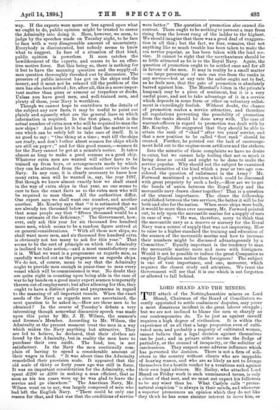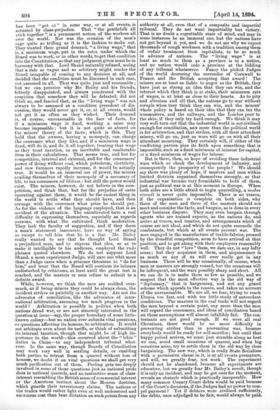LORD SHAND AND THE MINERS. T HE attack of the Nottinghamshire
miners on Lord Shand, Chairman of the Board of Conciliation re- cently appointed to settle coalminers' disputes, may prove a most disastrous incident in the great labour struggle ; but we are not inclined to blame the men so sharply as our contemporaries do. To be just as against oneself requires a high degree of civilisation. It is within the experience of us all that a large proportion even of culti- vated men, and probably a majority of cultivated women, cannot believe that a legal decision against themselves can be just; and in private either accuse the Judge of partiality, or the counsel of incapacity, or the solicitor of carelessness. They suspect some adverse influence which has perverted the decision. There is not a firm of soli- citors in the country without clients who are incapable of hearing reason, and who are as likely as not to avenge themselves for a hostile verdict by a vexatious suit against their own legal advisers. Mr. Bailey, who attacked Lord Shand on Friday week in such unmeasured terms, is only a client of that sort, and we must not expect his followers to be any wiser than he. What Carlyle calls preter- natural suspicion" is always in their minds, and whenever a superior pronounces an opinion which they do not like they think he has some sinister interest to move him, or has been " got at " in some way, or at all events, is actuated by class-prejudice. That " the gentlefolk all stick together " is a permanent notion of the workers all over the world. Nor was the occasion of the men's rage quite so trifling as it is the fashion to make out. They wanted their grand demand, " a living wage," that is, a minimum wage, put in the rules under which the Board was to work, or in other words, to get that condition into the Constitution, so that any judgment given must be in harmony with that. Lord Shand naturally refused, seeing that a rule so vague and so arbitrary might render the Board incapable of coming to any decision at all, and decided that the condition must be discussed in each case, not assumed in all. That was quite just and reasonable ; but we can perceive why Mr. Bailey and his friends, bitterly disappointed, and always penetrated with the suspicion that somehow they will be defeated, did not think so, and fancied that, as the " living wage " was not always to be assumed as a condition precedent of dis- cussion, they would never get it, or, at all events, would not get it as often as they wished. Their demand is, of course, unreasonable in the face of facts, for if a minimum wage is fixed, working a. mine may become impossible ; but it is not quite so absurd on the miners' theory of the facts ; which is this. They hold that the owners, having a monopoly, can charge the consumer what they like, and if a minimum wage is fixed, will do it, and do it all together, treating that wage as they treat taxation, as an inevitable and unalterable item in their calculations. That seems true, and but for competition, internal and external, and for the consumers' power of doing without coal, which petroleum, electricity, and new furnaces rapidly increase, it would be actually true. It would be an immoral use of power, the miners availing themselves of their monopoly of a necessary of life, to tax consumers ad libitum ; but still the power would exist. The miners, however, do not believe in the com- petition, and think that, but for the prejudice of caste operating against them, it would be the easiest thing in the world to settle what they should have, and then arrange with the consumer what price he should pay. As for the violence of the language employed, that is an accident of the situation. The uncultivated have a real difficulty in expressing themselves, especially as regards persons, with what the cultivated think moderation. They lack the faculty of suggestion, and if they deem a man's statement inaccurate, have no way of saying so except to tell him that he is a liar. Mr. Bailey really wanted to say that he thought Lord Shand a prejudiced man, and to express that idea, so as to make it intelligible to his audience, employed the rude phrases quoted elsewhere. We do not suppose Lord Shand, a most experienced Judge, will care one whit more than a Judge cares when a prisoner threatens to " do for him," and trust that the Board will continue its labours undisturbed by criticisms, at least until the great test is reached, and the masters or men refuse to submit to a definite award.
While, however, we think the men are scolded over- much, as if being miners they could be always clean, the incident strikes us painfully in another way. Are not the advocates of conciliation, like the advocates of inter- national arbitration, assuming too much progress in the world ? Arbitration is possible in politics when both nations dread war, or are not sincerely interested in the question at issue—say, the proper boundary of some little- known colony—but no nation ever submits vital questions, or questions affecting its honour, to arbitration. It would not arbitrate even about its tariffs, or think of submitting its internal taxation, though that might be of high im- portance to the world—this occurred about the " lekin " duties in China—to any independent tribunal what- ever. In the same way, though Boards of Conciliation may work very well in settling details, or enabling both parties to retreat from a quarrel without loss of honour, we doubt if on vital questions we shall get very much pacification out of them. Feeling gets too deeply involved in some of these questions just as national pride does in national quarrels, and an instinctive sense of class- interest resembling the British sense of commercial interest or the American instinct about the Monroe doctrine, which guards their reversionary claims. The nations or the trades would rather fight even at well understood and enormous cost than bear dictation on such points from any authority at all, even that of a composite and impartial tribunal. They do not want impartiality but. victory. That is no doubt a regrettable state of mind, and may in some instances be an immoral one, but the nations have not got beyond it yet, and we do not see why we expect thousands of rough workmen with a tradition among them of unfair treatment from capitalists, to be so much in advance of nations. The " living wage " is at least as much to them as a province is to a nation, and no nation would cede a province at the bidding of any tribunal whatsoever. Fancy the picked Judges of the world decreeing the surrender of Cornwall to France, and the British accepting that award ! The miners are at least as liable to anger as the British, they have just as strong an idea that they can win, and the interest which they think is at stake, their minimum rate of wages, is at least as close to their hearts. As to pity and altruism and all that, the nations go to war without scruple when they think they can win, and the miners' whole policy is based on their idea that they can tax the ironmasters, and the railways, and the London poor to the skin, if they only try hard enough. We think it may very well turn out that the industrial world is not civilised enough for conciliation, any more than the political world is for arbitration, and that strikes, with all their attendant misery, will go on, just as wars will go on with all their attendant mourning. They certainly will, if either of the conflicting parties pins its faith upon something that is impossible, such as a fixed minimum of interest for capital, or a fixed minimum of wages for labour.
But is there, then, no hope of avoiding these industrial wars which so check the development of industry, and consequently the prosperity of the people ? We should say there was plenty of hope, if masters and men within limited districts organised themselves strongly, so that industrial war became very formidable to both of them, just as political war is at this moment in Europe. When both sides are a little afraid to begin quarrelling, a modus vivendi is never quite impossible. There is no reason, if the organisation is complete on both sides, why three of the men and three of the masters should not meet and consider the facts, and bargain, as is done in every other business dispute. They may even bargain through agents who are trained experts, as the nations do, and arrive at truces, and treaties, and arrangements which of course are not ideal, and which do not quite reconcile the combatants, but which at all events prevent war. The men engaged in the manufacture of textile fabrics, pressed by the dreadful competition, seem to have arrived at that position, and to get along with their employers reasonably well. They do not " love " them, we dare say, in any lofty sense; but they acquiesce in them, and acquiescence is as much as any of us will ever really get in any business. There will be war occasionally, of course, when men or masters are strongly roused, but the occasions will be infrequent, and the wars possibly sharp and short. All we can do is to make them as few as possible, and we suspect that the most effective way is the old way of " diplomacy," that is bargaining, and not any grand scheme which appeals to the reason, and takes no account of the unreasonable. We are all, we fear, trying to reach Utopia too fast, and with too little study of antecedent conditions. The masters in the coal trade will not regard the men beyond a certain point, any more than the men will regard the consumers, and ideas of conciliation based on those assumptions will almost infallibly fail. The con- testants are not good enough. If we were all real Christians, there would be no more difficulty in preventing strikes than in preventing war, because everybody would be ready for self-sacrifice ; but until that happy period arrives, we must just stumble along as best we can, avoid small occasions of quarrel, and when big occasions arise, try to settle them in the old way by close bargaining. The new way, which is really State Socialism with a permissive clause in it, is at all events premature, and will, we greatly fear, not work. The experiment should not be abandoned, because all experiments are educative, but we greatly fear Mr. Bailey's revolt, though it is only an incident, and may be got over for the moment, reveals an obstacle which is practically insuperable. How many common County Court debts would be paid because of the Court's decisions, if the Judges had no power to com- pel payment? Yet if debtors were civilised sufficiently, the debts, once adjudged to be fair, would always be paid.



































 Previous page
Previous page